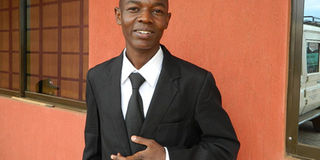Childhood dream to start health centre becomes a reality

At 21, Jack Hisard, a student at JKUAT runs a health centre in his rural home in Suna, Migori County. He has seven staff, including a doctor. PHOTO/KINUTHIA MBURU
What you need to know:
- He is a third year student at the Jomo Kenyatta University of Agriculture and Technology.
- His desire and passion for medicine began at the age of five, in 1998, when his mother suffered stroke.
- Already, he has sponsored three children at Oburu Secondary School, Obolo Secondary School and Kanyawanga High School.
It is hard to imagine that Jack Hisard, 21, is an entrepreneur when you first meet him.
You see, he is a third year student at the Jomo Kenyatta University of Agriculture and Technology.
“I am studying a degree in Bachelor of Science in Biochemistry and Molecular Biology.”
“I started the clinic slightly over a year ago aged 19 and I am glad that it has been fully accredited by the medical board,” says the soft-spoken first born in a family of three.
“It’s called Mama Clinic and is in Suna, Migori County.”
“I have always felt convinced that a hospital and a medical-related career were all that I wanted to pursue.”
His desire and passion for medicine began at the age of five, in 1998, when his mother suffered stroke.
“She had been a casual labourer in various farms in Muhuru Bay earning Sh120 per day.”
Two years earlier, Mr Hisard helplessly watched his father succumb to malaria.
“We were having dinner when he collapsed. Nobody could save him since there was no hospital nearby.”
After his mother was taken ill, the family struggled to survive.
“We would go for two to three days without food.
Our mud, grass-thatched house leaked whenever it rained.
I had no choice but to go out and look for a job to fend for my younger siblings and my mother,” he says.
In 2002, Mr Hisard started fishing in Lake Victoria.
“I would sell my catch at Sh60 or Sh50 and use the money to buy maize flour and kerosene.
Sometimes, I would carry the fish home for food.”
He used to fish in the early morning or late afternoon before and after school during the week.
Constant reminder
The hardships were a constant reminder that he had to work hard for a better future.
“After my father’s death and my mom’s stroke, I saw friends and neighbours succumb to preventable and treatable diseases such as malaria, tuberculosis and pneumonia due to lack of a medical facility in our village. I dreamt of starting one.”
On completing his secondary education at Jamhuri High School, in 2006, Mr Hisard hired a farm at Sh23,000 for two seasons and planted sukuma wiki and tomatoes.
“I used the money I had saved from fishing.”
In his first harvest, he sold his produce in Migori town but ventured in Kisii town later.
“I saved Sh300,000 which I used to set up the clinic in 2013 after renting the offices of a former private primary school.
I was in my second year at the university.”
Today, his clinic is worth about Sh500,000. And he has established links with referral hospitals such as the Kenyatta National Hospital and Moi Teaching and Referral Hospital, in Eldoret, where critical cases are taken.
“I have not entered into any partnership with drug suppliers or found a donor wishing to inject money into the hospital,” he says.
The drugs and equipment at his clinic are bought by the income he gets. But, the proceeds turn out to be his biggest challenge.
“The income is marginal especially given that the hospital is in a rural area where there are a high number of diseases and ailing residents, but who have low incomes.”
Seven employees
On a normal day, Mr Hisard’s clinic serves about 50 patients.
“However, there are days we get between 80 and 100,” he says, adding that at least 12 of his patients get booked for further treatment and observation.
Although his clinic is one-and-a-half years old, he has managed to hire seven employees — a doctor, two nurses, a laboratory technician, receptionist, guard, cook and cleaner.
“The doctor takes charge when I am in school.
However, I always make sure that I am informed on every activity at the clinic daily,” he says.
The clinic focuses on treatment of common illnesses such as malaria, tuberculosis, pneumonia, bacteria and viral infections.
“We also offer maternal health care and offer inpatient services, especially for deliveries.”
Sponsor children
His investment has also started a programme to help poor children access education.
“I was forced to work from an early age. I want to change this by helping needy children access education.”
Already, he has sponsored three children at Oburu Secondary School, Obolo Secondary School and Kanyawanga High School.
“I believe that I could have a brighter future. I have not stopped to dream, study and work hard.
In a few years, my small hospital will be a fully-fledged hospital,” he says with conviction




